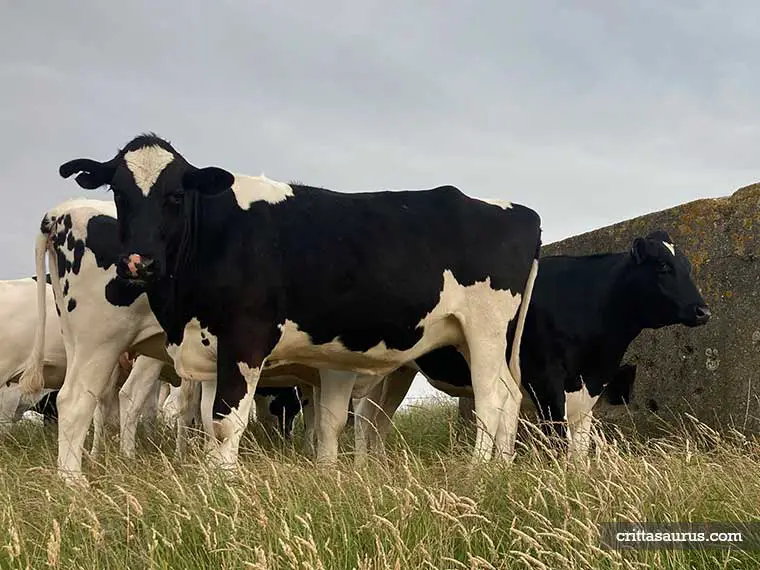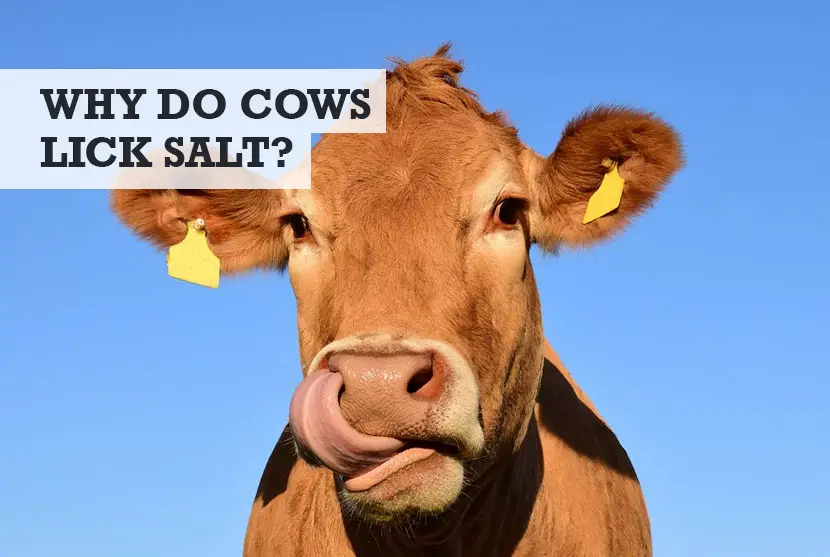Ever heard the old wives’ tale, “salt is to a cow what candy is to a child?” To mean, a cow will never say no to salt in the same way a child can’t refuse candy. So, why is it that cows always have an appetite for liking salt? You’ll find out in this article.
Why do cows lick salt? Cows like salt’s natural taste. Salt is their favorite mineral. Have you ever watched cows licking salt? They lick non-stop. Cows have a rough tongue that isn’t irritated by the taste of salt.
You’ll hardly find a cow shying away from licking salt.
Keep reading as I break down for you why cows need salt, the different ways they enjoy salt, and what happens when you don’t satisfy their salt cravings.
Why do cows enjoy licking salt (and how salt helps their bodies)?
Let’s start with the basics first.
Cows need minerals for their body functions to work as normal. Sodium and chloride are among the many minerals that cows need. These two minerals make up salt.
It’s hard to think of a nutrient that can provide cows with all the benefits that salt gives.
If salt isn’t part of your cows’ daily diet, you’d be lying if you said that you always give your cows a balanced diet.
Is salt good for cows?
1. It increases their water intake
I’ll dig deeper into this because it’s the most important reason cows need and like salt.
When cows take salt daily as recommended, dehydration becomes a long-gone problem. Salt helps release hormones that trigger thirst in cows.
You won’t have to worry about your cows not drinking enough water during cold months.
Give them enough salt ﹘ it will do the magic.
The more water your cow takes, the more it replaces the water it’s lost through urination, milk production, diarrhea, sweating, and excretion.

Here are more reasons why salt is good for cows:
2. The sodium in salt helps a cow’s muscles to function well, and can even be good for their heart(s).
3. The sodium in salt also enables a cow’s central nervous system to work properly.
4. The chloride in salt balances a cow’s blood PH.
5. The chloride in salt also controls the movement of fluids in and out of a cow’s internal cells.
6. The chloride in salt helps produce HCL, hydrochloric acid, in a cow’s digestive system. Without enough HCL, a cow won’t digest proteins properly.
Best believe that when you make salt part of your cows’ daily diet, your cows will look better, feel better, and perform better in all seasons.
Don’t forget that as you provide salt for your cows, let there be fresh, clean water nearby at all times.
There are different ways cows enjoy salt. Here are a few ways you can respond to your cows’ salt cravings:
- Preparing them an electrolyte solution. You make this solution by dissolving salt in water.
- Giving them plain loose salt in containers where they can lick from.
- Adding loose salt directly to their feed.
- Adding loose salt in their mineral mix.
- Giving them salt blocks.
Handy Hint: Cows diets will often change in winter.
And why do cows always have an urge to lick salt?
Cows like salt because it adds flavor to their meals ﹘ for example, a mineral mix. Cow owners love preparing a mineral mix for their cows. This mix often contains minerals like potassium, phosphorus, calcium, magnesium, and the likes.
Sometimes, cow owners add salt to this mix. Other times, they don’t.
Cows will finish up a mineral mix that has salt in it. But they’ll most likely leave a mineral mix without salt halfway.
Think about the many times you treat yourself to some french fries. Don’t you add salt to make them taste better? Salt has the same effect on a cow’s meal. It gives cows an appetite to enjoy the ‘boring’ meals.
Cows don’t find some minerals tasty ﹘ for instance, phosphorus. Salt in mineral mix covers the unpleasant taste of phosphorus. So, a cow won’t even notice the phosphorus’s awful taste when there’s salt in the mix.
Cows love salt because their tongues can handle salt’s bitter taste. See how you feel that irritating tingling sensation when you lick even the smallest amount of salt? Cows can’t relate. How cool is that?
Cows also like to lick salt out of boredom. It’s common for farmers to put salt blocks in different parts of the field where their cows graze, as shown in this video.
At times, cows aren’t in the mood for grazing. When cows are bored, you’ll spot them licking salt blocks in the field (for the sake of it and not because they’re craving some salt).
The good thing is, cows aren’t picky when it comes to salt.
You don’t have to go through the trouble of looking for some fancy salt on some old, dried-up seabed. But, keep in mind cows have their taste preferences for salt.
It’s up to a cow owner to do a bit of trial and error to know what types of salt their cows enjoy more.
Salt comes in different forms and types. A cow owner has the option of buying:
- Plain white salt blocks ﹘ These blocks are made purely from sodium chloride. They’re rock hard and shaped like blocks. That’s how the name “salt block” came about.
A cow can’t bite chunks of salt from a salt block. They lick the block as you would an ice cream cone. You can place salt blocks outside without worrying about the block dissolving in the rain (when it rains).
- Trace mineral salt blocks ﹘ These are salt blocks with sodium chloride and other trace minerals that cows need in small quantities: like zinc, cobalt, iron, and manganese.
If you notice your cows love the taste of trace mineral salt blocks, by all means, go for it.
- Himalayan salt (or rock salt) ﹘ Himalayan salt is mined from rocks. It contains high amounts of natural sodium chloride because these salts aren’t heavily processed.
This salt has a pinkish color. You can get it in form of salt blocks or small salt granules.
- Loose table salt and sea salt ﹘These are the regular salts we find in grocery stores and use in our foods. We call them loose because of their fine particles.
- Iodized salt blocks ﹘ These salt blocks contain both iodine and sodium chloride. Iodine prevents thyroid problems in cows.
During cold weather, salt blocks placed outside can get really cold.
The best option (during cold weather) would be giving cows loose salt instead of salt blocks.
You might be wondering, how much salt do cows need per day? Use this simple rule of thumb:
The quantity of salt to give a cow should be 0.005 to 0.010 % of the cow’s body weight.
So, if your cow weighs 1000 pounds, it needs 0.05 to 0.10 pounds of salt every day. In grams, that’s around 22g to 45g daily.
If you don’t give your cows enough salt, you’ll be a devasted cow owner. Why is that?
- Your cows will start licking soil and other unusual objects like tree barks and wood.
- They can become anorexic.
- They’ll get painful muscle cramps.
- They’ll have severe fatigue and no energy to be active.
- They’ll experience instability when walking.
- They can get too weak and collapse.
Related questions
Is salt good for cows?
Yes, it is. Salt helps cows to maintain good health, as I’ve mentioned earlier.
Why do cows like salt licks?
Cows find salt licks tasty.
What is a salt lick for cows?
A salt lick is a salty substance that cows rub their tongues on to satisfy their salt cravings.
Why are cows licking the salt block like crazy?
Cows love the natural taste of salt minerals in salt blocks.
Do cows like salt water?
Yes, they do. Cows like salt in any form, including in solution form. But only add the recommended amount of salt in the water.
Conclusion
Last winter I was driving through the local forest when I saw cows in the middle of the road, licking the tarmac. It turns out the roads had been salted by the local authority to help vehicle grips.
But the cows like salt so much, they were going onto the road and licking the salt up!
You might also like…
- Here’s how high a cow can jump!
- A cow’s favorite vegetables is quite surprising
- The best drink to give to baby cows
Image in header via https://pixabay.com/photos/cow-lick-tongue-head-cow-head-1715829/


